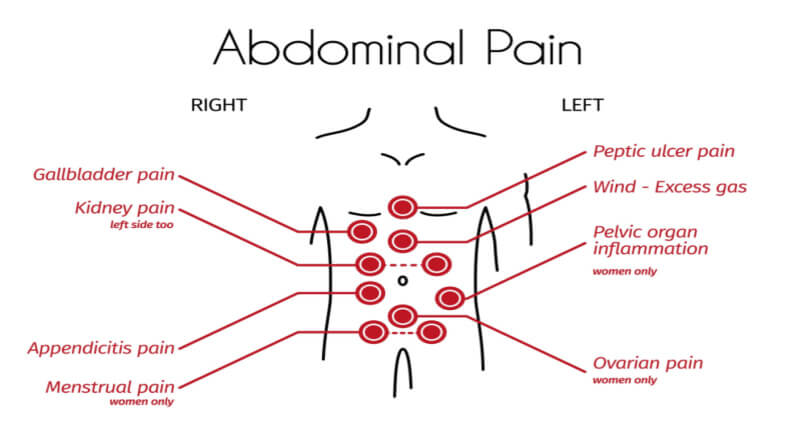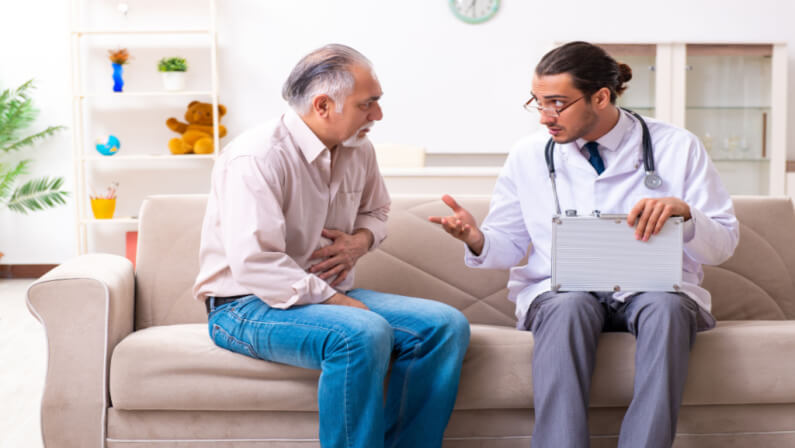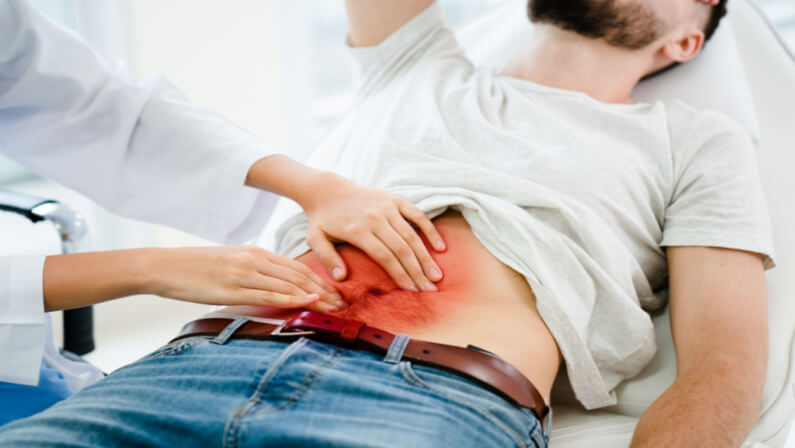Abdominal pain is a common occurrence that most people experience at some point in their lives. It can be caused by a variety of factors, ranging from indigestion to more serious conditions like appendicitis. In most cases, abdominal pain is not a cause for concern and will go away on its own. However, there are some instances where you should see a doctor for abdominal pain.
If the pain is severe or accompanied by other symptoms like vomiting, shortness of breath, acid reflux, fever, or blood in the stool, you should seek medical attention for the stomach virus.
This article will discuss everything you need to know about abdominal pain and when to see a doctor if you are experiencing one.
What is abdominal pain?
Abdominal pain is a type of pain experienced when the abdominal muscles contract. It can be caused by a variety of things in the digestive system, such as indigestion, gas, constipation, diarrhea, or a more serious condition like appendicitis.
Most people experience abdominal pain at some point in their lives, especially those who have problems in the stomach, large intestine, and small intestine. It is usually not a cause for concern and will go away on its own within a few days. However, there are some instances where you should see a doctor for abdominal pain and any medical problem.
How common is stomach pain?
Stomach pain is a common occurrence. In fact, nearly everyone experiences it at some point in their lives.
When a person experiences stomach-stabbing pain, it is usually not a cause for concern and will go away on its own. However, there are some instances where you should see a doctor for abdominal pain.
Four Types of Abdominal Pain

There are four common types of abdominal pain, which are:
Right upper quadrant
This is a type of abdominal pain where the right upper quadrant of the abdominal is more painful and is associated with bloating, belching, and nausea.
Left upper quadrant
Meanwhile, this type of abdominal pain is more common in women and is associated with pain in the left side upper quadrant of the abdomen. Once you feel pain in this area, it can result in breast tenderness, fatigue, and headaches.
Right lower quadrant
When the pain in your abdomen is felt on the lower right side, it can be a sign of appendicitis, which is a serious medical condition that requires surgery.
Left lower quadrant
Lastly, this type of abdominal pain is more common in women and is associated with pain in the left lower quadrant of the abdomen. It can also be a sign of ovarian cysts, endometriosis, or pelvic inflammatory disease (PID).
Acute vs. Chronic Abdominal Pain
Now that you know the four types of abdominal pain, let’s discuss the difference between acute and chronic abdominal pain.
Acute abdominal pain is a type of pain that comes on suddenly and lasts for a short period of time. It is usually not a cause for concern and will go away on its own within a few days.
Chronic abdominal pain, on the other hand, is a type of pain that persists for weeks or even months. It can be a sign of a more serious underlying medical condition and requires medical attention.
When to See a Doctor for Abdominal Pain

There are some instances where you should see a doctor or medical care for abdominal pain, which include:
The pain has stuck around for more than a day, and it’s spreading into your back
Once you feel the pain for more than 12 hours and it is accompanied by other symptoms like fever, this is a sign that you need to see a doctor.
The pain is pretty intense and accompanied by bloody diarrhea
Bloody diarrhea is a bad sign when associated with abdominal pain. If this is the case, you need to see a doctor as soon as possible.
You have other concerning symptoms like weight loss, vomiting, or fever
If you have other worrying symptoms like these, it’s best to consult a doctor to rule out any serious underlying medical conditions.
The pain is felt in your lower right abdomen and keeps getting worse
This type of pain can be a sign of appendicitis, which is a serious medical condition that requires surgery.
The pain is in your side or lower back, and it hurts to pee: Difficulty in urinating can also be a sign of a kidney stone. If you feel this type of pain, it’s best to see a doctor right away and get a proper diagnosis.
You have intense stomach cramps in your lower abdomen, but you feel better after you poop
Although stomach cramps and menstrual cramps can be normal, abdominal pain can also be a sign of irritable bowel syndrome (IBS) and inflammatory bowel diseases. If you have this type of pain, it’s best to see a doctor to get a proper diagnosis.
The pain is especially intense during your period and has been getting worse over the year
If you experience this type of pain, it’s best to see a doctor to rule out any serious underlying medical conditions like endometriosis.
The pain is sudden, sharp, and on one side of your pelvis, followed by dull pain in your lower abdomen
Lastly, this type of pain can be a sign of an ectopic pregnancy, which is when the fertilized egg implants itself outside of the uterus. If you experience this type of pain, it’s important to see a doctor right away.
When to seek emergency care for abdominal pain

When your abdominal pain is increasing drastically and shows no sign of subsiding, it is important to seek emergency care.
Other warning signs that indicate you should go to the hospital include:
- The pain is in your chest and you are having trouble breathing.
- You have a history of pancreatitis and the pain is intense and radiating to your back.
- You are pregnant and the pain is in your lower abdomen and you are bleeding vaginally.
- You have a history of kidney stones and the pain is intense and accompanied by blood in your urine.
- You have sudden, sharp abdominal pain and you are also vomiting blood.
Common diagnosis of severe abdominal pains
There can be possible causes for severe abdominal pains, which your doctor will need to rule out.
These include:
- Kidney stones. This diagnosis shows up when you have intense pain in your lower abdomen, back, or sides. The pain is usually accompanied by blood in your urine.
- Appendicitis. This is a serious condition that requires surgery. The pain usually starts in the lower right abdomen and gets worse over time.
- Gallstones. This condition usually causes pain in the upper right abdomen, and the pain can radiate to your right shoulder.
- Gastroesophageal reflux disease. This condition can cause pain in the lower chest or upper abdomen. The pain is usually worse after eating.
- Endometriosis. This is a condition that can cause severe abdominal pain during your period. The pain is often accompanied by other symptoms like fatigue, nausea, and changes in bowel movements.
- Hernia. This condition can cause pain in the groin or abdomen. The pain is usually worse when you cough, sneeze or lift something heavy.
Have Your Abdominal Pain Treated Right Away

In conclusion, abdominal pain can be caused by various factors. It is important to pay attention to the location, intensity, and duration of your pain in order to determine whether or not you need to call your doctor. If you are ever unsure, it is always best to err on the side of caution and consult a medical professional.
At Aether Health – SilverLake ER, we offer comprehensive and quick care for all types of abdominal pain in SilverLand, Pearland, TX. Our emergency department is open 24/7, 365 days a year so that you can always get the treatment you need when you need it. We also offer on-site laboratory testing and imaging services so that you can get a diagnosis quickly and start on your road to recovery.
Don’t wait – come see us at Aether Health – SilverLake ER today!




